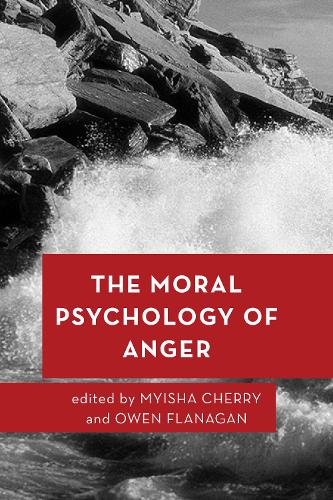
The Moral Psychology of Anger
(Paperback)
Available Formats
Publishing Details
The Moral Psychology of Anger
By (Author) Myisha Cherry
Edited by Owen Flanagan
Bloomsbury Publishing PLC
Rowman & Littlefield International
26th June 2019
United Kingdom
Classifications
Professional and Scholarly
Non Fiction
Ethics and moral philosophy
Psychology: emotions
179.8
Physical Properties
Paperback
212
Width 149mm, Height 229mm, Spine 16mm
313g
Description
The Moral Psychology of Anger is the first comprehensive study of the moral psychology of anger from a philosophical perspective. In light of the recent revival of interest in emotions in philosophy and the current social and political interest in anger, this collection provides an inclusive view of anger from a variety of philosophical perspectives. The authors explore the nature of anger, explain its resilience in our emotional lives and normative frameworks, and examine what inhibits and encourages thoughts, feelings, and expressions of anger. The volume also examines rage, anger's cousin, and examines in what ways rage is a moral emotion, what black rage is and how it is policed in our society; how berserker rage is limited and problematic for the contemporary military; and how defenders of anger respond to classical and contemporary arguments that expressing anger is always destructive and immoral. This volume provides arguments for and against the value of anger in our ethical lives and in politics through a combination of empirical psychological and philosophical methods. This authors approach these questions and aims from a historical, phenomenological, empirical, feminist, political, and critical-theoretic perspective.
Reviews
This is a rich and timely volume, offering several new contributions to the longstanding debate about the morality of anger: whether it is, as Seneca claimed, the most hideous and frenzied of all the emotions or, as Audre Lorde said, a powerful source of energy serving progress and change. -- Amia Srinivasan, Assistant Professor of Philosophy at UCL and Fellow of All Souls College, University of Oxford
Anger is an emotion that has historically been the subject of sharply conflicting philosophical assessments, from condemnation as prohibited to prescription as morally demanded of us. This valuable anthology of new work provides a stimulating range of perspectives both Western (analytic, phenomenological) and Eastern (Buddhist) on this important issue and the implications for a healthy moral psychology. -- Charles Mills, Professor of Philosophy at the City University of New York
This is the most encompassing and edifying philosophical exploration of anger available today. Topics range from ancient thought to social media, from Buddhist sutras to modern battlefields, from phenomenology to cognitive neuroscience, from personal relationships to liberation politics, and from cautionary critiques to empowering endorsements. Each contribution provides both helpful background and illuminating perspective on our most volatile and potent passion. -- Jesse Prinz, Distinguished Professor of Philosophy and Director of the Committee for Interdisciplinary Science Studies at the Graduate Center of the City University of New York
In this timely book Cherry (Univ. of California, Riverside) and Flanagan (Duke Univ.) offer an array of valuable insights about the moral importance of certain kinds of anger. Most of the essays address philosopher Martha Nussbaums view that anger is at heart an irrational desire for revenge that offers no benefit. One also finds more nuanced approaches to understanding anger, such as Aristotles view that anger at the right time for the right reasons is virtuous. Others hold that anger is a necessary reaction to the violation of valued norms. Anger is also seen to be a demand for respect and recognition denied to oppressed peoplea demand that perpetrators acknowledge that their acts are not acceptable. Contributor Emily McRae points out the extra moral and psychological effort oppressed people must make when trying to control anger against countless daily transgressions of their dignity. Anger is in part communicative: when uptake is refused by those in power the burden increases. Negative judgments about anger only add to the self-depreciation of the oppressed. Yet ideals of racial and economic equality are notoriously threatening to the privileged, who construct so-called empathy walls so as to avoid taking seriously the moral demands in question. Summing Up: Recommended. Lower-division undergraduates through faculty and professionals; general readers. * CHOICE *
Author Bio
Myisha Cherry is an Assistant Professor of Philosophy at the University of California, Riverside. Her other books include UnMuted: Conversations of Prejudice, Oppression, and Social Justice (2019). Her TEDx talk on anger has been viewed thousands of times. Owen Flanagan is James B. Duke Professor of Philosophy at Duke University. He is the author of Varieties of Moral Personality: Ethics and Psychological Realism (1991), Consciousness Reconsidered (1992) and The Geography of Morals: Varieties of Moral Possibility (2016).
